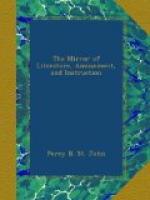Poiet. These, as well as the omens of death-watches, dreams, &c., are for the most part founded upon some accidental coincidences; but spilling of salt, on an uncommon occasion, may, as I have known it, arise from a disposition to apoplexy, shown by an incipient numbness in the hand, and may be a fatal symptom; and persons, dispirited by bad omens, sometimes prepare the way for evil fortune; for confidence in success is a great means of ensuring it. The dream of Brutus, before the field of Pharsalia, probably produced a species of irresolution and despondency, which was the principal cause of his losing the battle: and I have heard that the illustrious sportsman to whom you referred just now, was always observed to shoot ill, because he shot carelessly, after one of his dispiriting omens.
Hal. I have in life met with a few {36} things which I found it impossible to explain, either by chance coincidences or by natural connexions; and I have known minds of a very superior class affected by them,—persons in the habit of reasoning deeply and profoundly.
Phys. In my opinion, profound minds are the most likely to think lightly of the resources of human reason; and it is the pert, superficial thinker, who is generally strongest in every kind of unbelief. The deep philosopher sees chains of causes and effects so wonderfully and strangely linked together, that he is usually the last person to decide upon the impossibility of any two series of events being independent of each other; and in sciences, so many natural miracles, as it were, have been brought to light,—such as the fall of stones from meteors in the atmosphere, the disarming of a thunder-cloud by a metallic point, the production of fire from ice by a metal white as silver, and referring certain laws of motion of the sea to the moon,—that the physical inquirer is seldom disposed to assert, confidently, on any abstruse subjects belonging to the order of natural things, and still less so on those relating to the more mysterious relations of moral events and intellectual natures.
* * * * *
DEVIL’S HOLE, KIRBY STEPHEN.
(For the Mirror.)
At about three quarters of a mile east of Kirby Stephen, Westmoreland, is a bridge of solid rock, known by the name of Staincroft Bridge or Stonecroft Bridge, under which runs a small but fathomless rivulet. The water roars and gushes through the surrounding rocks and precipices with such violence, as almost to deafen the visitor. Three or four yards from the bridge is an immense abyss, where the waters “incessantly roar,” which goes by the name of Devil’s Hole; the tradition of which is, that two lovers were swallowed up in this frightful gulf. The neighbouring peasants tell a tale of one Deville, a lover, who, through revenge, plunged his fair mistress into these waters, and afterwards followed her.




